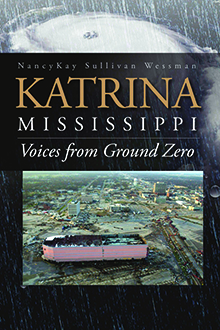Book tells Mississippi first responders' true stories

Few people know that as Hurricane Katrina hammered the Mississippi Gulf Coast in August 2005, emergency responders who hunkered in the operations center in Gulfport feared storm waters would force them to evacuate. In Hancock County, 35 individuals barely survived because they refused to leave the repurposed bowling alley that housed their operations center.

“So far as I"ve been able to find, this is the first book to go inside and through a natural disaster from the emergency preparedness and public health perspectives as a work of creative nonfiction,” says Wessman.
She approached the work from her 25-year career as communications and public relations director of Mississippi"s statewide public health agency. Formerly a weekly newspaper journalist, she earned a master of public health degree from Tulane University School of Public Health and Tropical Medicine in 1989.
While developing Katrina, Mississippi, in 2012, Wessman published her first book as co-author with Dr. Gerald S. Berenson, internationally acclaimed cardiologist, research scientist at Tulane University and founder of the Bogalusa Heart Study.
The new 10th anniversary commemorative book showcases heroes and their work from the epicenter of preparedness, response, rescue, recovery and rebuilding.
Their work and the successful first-ever employment of the unified command concept under the National Response Framework can instruct other first responders about preparedness and response, whether the emergency involves weather, wildfires, bioterrorism, emerging infectious diseases, or a plane crash or train wreck, Wessman says.
